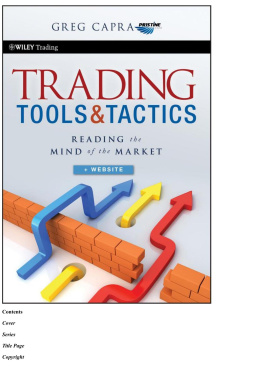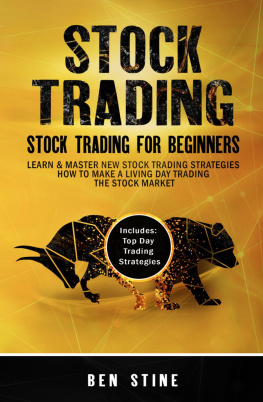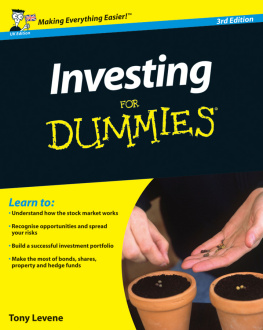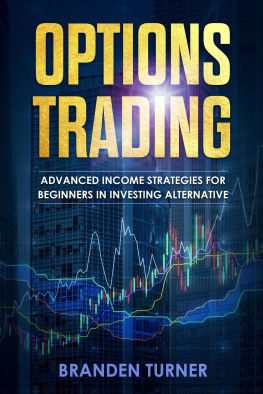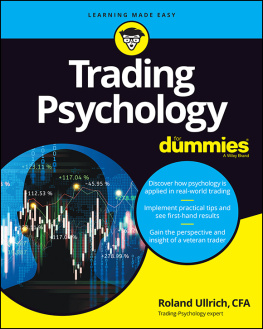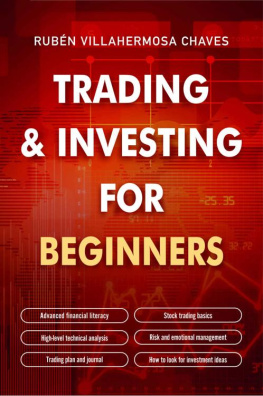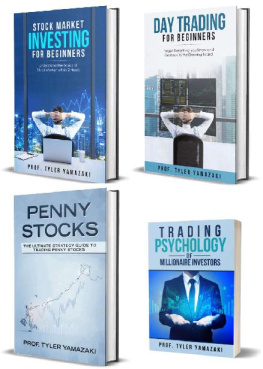Denise Shull - Market Mind Games: A Radical Psychology of Investing, Trading and Risk
Here you can read online Denise Shull - Market Mind Games: A Radical Psychology of Investing, Trading and Risk full text of the book (entire story) in english for free. Download pdf and epub, get meaning, cover and reviews about this ebook. year: 2012, publisher: McGraw-Hill Education, genre: Romance novel. Description of the work, (preface) as well as reviews are available. Best literature library LitArk.com created for fans of good reading and offers a wide selection of genres:
Romance novel
Science fiction
Adventure
Detective
Science
History
Home and family
Prose
Art
Politics
Computer
Non-fiction
Religion
Business
Children
Humor
Choose a favorite category and find really read worthwhile books. Enjoy immersion in the world of imagination, feel the emotions of the characters or learn something new for yourself, make an fascinating discovery.

- Book:Market Mind Games: A Radical Psychology of Investing, Trading and Risk
- Author:
- Publisher:McGraw-Hill Education
- Genre:
- Year:2012
- Rating:3 / 5
- Favourites:Add to favourites
- Your mark:
- 60
- 1
- 2
- 3
- 4
- 5
Market Mind Games: A Radical Psychology of Investing, Trading and Risk: summary, description and annotation
We offer to read an annotation, description, summary or preface (depends on what the author of the book "Market Mind Games: A Radical Psychology of Investing, Trading and Risk" wrote himself). If you haven't found the necessary information about the book — write in the comments, we will try to find it.
Denise Shull: author's other books
Who wrote Market Mind Games: A Radical Psychology of Investing, Trading and Risk? Find out the surname, the name of the author of the book and a list of all author's works by series.
Market Mind Games: A Radical Psychology of Investing, Trading and Risk — read online for free the complete book (whole text) full work
Below is the text of the book, divided by pages. System saving the place of the last page read, allows you to conveniently read the book "Market Mind Games: A Radical Psychology of Investing, Trading and Risk" online for free, without having to search again every time where you left off. Put a bookmark, and you can go to the page where you finished reading at any time.
Font size:
Interval:
Bookmark:
To my father, Wayne E. Shull, originally of Dover, Ohio, who first explained the stock market to me when I was nine. I said, Really, you own parts of companies? Little did I know then that he was the quintessential buy-and-hold investor. He began buying T (ATT) in the '40s and left it for me to sell. I am quite sure, because he said so, that he didnt know how to sell a share of stock. My becoming a trader, in 1994, met with what can only be called bemusement on his part.
MARKET
MIND GAMES


Copyright 2012 by Denise K. Shull. All rights reserved. Except as permitted under the United States Copyright Act of 1976, no part of this publication may be reproduced or distributed in any form or by any means, or stored in a database or retrieval system, without the prior written permission of the publisher.
ISBN: 978-0-07-176152-9
MHID: 0-07-176152-7
The material in this eBook also appears in the print version of this title: ISBN: 978-0-07-175622-8, MHID: 0-07-175622-1.
All trademarks are trademarks of their respective owners. Rather than put a trademark symbol after every occurrence of a trademarked name, we use names in an editorial fashion only, and to the benefit of the trademark owner, with no intention of infringement of the trademark. Where such designations appear in this book, they have been printed with initial caps.
McGraw-Hill eBooks are available at special quantity discounts to use as premiums and sales promotions, or for use in corporate training programs. To contact a representative please e-mail us at bulksales@mcgraw-hill.com.
TERMS OF USE
This is a copyrighted work and The McGraw-Hill Companies, Inc. (McGraw-Hill) and its licensors reserve all rights in and to the work. Use of this work is subject to these terms. Except as permitted under the Copyright Act of 1976 and the right to store and retrieve one copy of the work, you may not decompile, disassemble, reverse engineer, reproduce, modify, create derivative works based upon, transmit, distribute, disseminate, sell, publish or sublicense the work or any part of it without McGraw-Hills prior consent. You may use the work for your own noncommercial and personal use; any other use of the work is strictly prohibited. Your right to use the work may be terminated if you fail to comply with these terms.
THE WORK IS PROVIDED AS IS. McGRAW-HILL AND ITS LICENSORS MAKE NO GUARANTEES OR WARRANTIES AS TO THE ACCURACY, ADEQUACY OR COMPLETENESS OF OR RESULTS TO BE OBTAINED FROM USING THE WORK, INCLUDING ANY INFORMATION THAT CAN BE ACCESSED THROUGH THE WORK VIA HYPERLINK OR OTHERWISE, AND EXPRESSLY DISCLAIM ANY WARRANTY, EXPRESS OR IMPLIED, INCLUDING BUT NOT LIMITED TO IMPLIED WARRANTIES OF MERCHANTABILITY OR FITNESS FOR A PARTICULAR PURPOSE. McGraw-Hill and its licensors do not warrant or guarantee that the functions contained in the work will meet your requirements or that its operation will be uninterrupted or error free. Neither McGraw-Hill nor its licensors shall be liable to you or anyone else for any inaccuracy, error or omission, regardless of cause, in the work or for any damages resulting therefrom. McGraw-Hill has no responsibility for the content of any information accessed through the work. Under no circumstances shall McGraw-Hill and/or its licensors be liable for any indirect, incidental, special, punitive, consequential or similar damages that result from the use of or inability to use the work, even if any of them has been advised of the possibility of such damages. This limitation of liability shall apply to any claim or cause whatsoever whether such claim or cause arises in contract, tort or otherwise.
The Markets Masquerade
What if the mystery of market crashes and trader or investor meltdowns stems from a simple but total misunderstanding of our own minds? Could everything we think we know about ourselvesintelligence and rationality versus emotion and irrationalitybe missing the mark?
Simply putyes.
Connecting the dots across the vast fields in neuroscience shows that we actually perceive, judge, and decide in ways that operate almost in diametric opposition to the reigning theories in psychology and economics. Somewhere between Socrates and the mid-20th century rise of the cognitive behavioral school of psychology, we promoted intellect to chairman of the board. In reality, the wide-ranging category of feelings, which includes both conscious and unconscious emotion, owns all the shares.
Now I am by far not the first to say that we misunderstand how we really think.
Nassim Taleb told us in his runaway bestseller, The Black Swan, that it looks like we have the wrong users manual and I could not agree more! The manual we need begins not with the assumed superiority of thought and reason but with the foundation of feeling and emotion, which contributes the meanings of anything and everything. For many decades now our attention has been focused almost exclusively on our thinking and our behavior. The more mysterious realm of feelings resided in the most relegated seat of all, that of being old, useless, and destructive. Ironically, linking together our failures to solve the mystery of meltdowns with the rapidly growing insights into how perceptions are formed proves that this dismissed realm belong front and center, first and foremost.
This overemphasis on our thinking (or cognition to use the academic term) underlies the second complaint of Talebs, which I also agree with: the great intellectual fraud, or GIF, of the bell curve. This bedrock of the field of probability (and by extension the endeavor of market predictions) stems from the misplaced emphasis on the seemingly unique human ability to discover and apply the numerical disciplines of algebra, calculus, and theoretical mathematics. In fact, one can argue that a zealous belief in an ostensibly omnipotent power of numbers has mislead us into our current reckoning with billion-dollar bonfires.
I do, however, part ways with Taleb when he says, A small number of Black Swans explain almost everything in our world. If we take the whole of what we now know about how we perceive anything imprecise or conflicting (like market data), it wont be Black Swans that will do the explaining. It will be a totally new operating guide for a fully interactive psychefully reciprocal thinking, feeling, and emotingthat transforms his first identifier of Black Swansan outlier, as it lies outside the realm of regular expectations, because nothing in the past can convincingly point to its possibilityinto nicely bleached birds. Not only will many things that might escape expectation be expected, but they will easily fall into his lower standard of the possible.
Taleb would almost certainly say that I am proving his third assertionin spite of outlier status, human nature makes us concoct explanations for its occurrence after the fact, making it explainable and predictable. But I am not talking about explaining after the fact, although better explanations of events do lead to an increase in knowledge overall; I am talking about the missing link in predicting. I am talking about picking up where our agreed upon GIF leaves off.
In plain English, I am simply saying that if we come to understand how we truly perceive, think, and decidehow all human brains take in, process, and act on datathat neither the explanations of randomness nor Black Swans will be so frequently needed. In fact, if we focus on the first oneperceptionwe will gain much. If we begin to incorporate the new realities of the sources of our own behavior in the market or in any high-risk decision, we will much more easily understand why we so often do that which we wish we wouldnt have.
Next pageFont size:
Interval:
Bookmark:
Similar books «Market Mind Games: A Radical Psychology of Investing, Trading and Risk»
Look at similar books to Market Mind Games: A Radical Psychology of Investing, Trading and Risk. We have selected literature similar in name and meaning in the hope of providing readers with more options to find new, interesting, not yet read works.
Discussion, reviews of the book Market Mind Games: A Radical Psychology of Investing, Trading and Risk and just readers' own opinions. Leave your comments, write what you think about the work, its meaning or the main characters. Specify what exactly you liked and what you didn't like, and why you think so.

